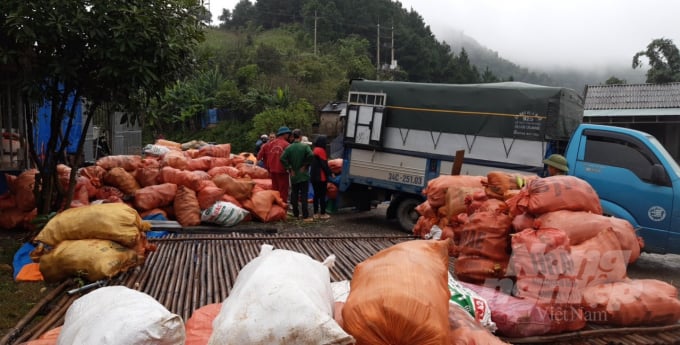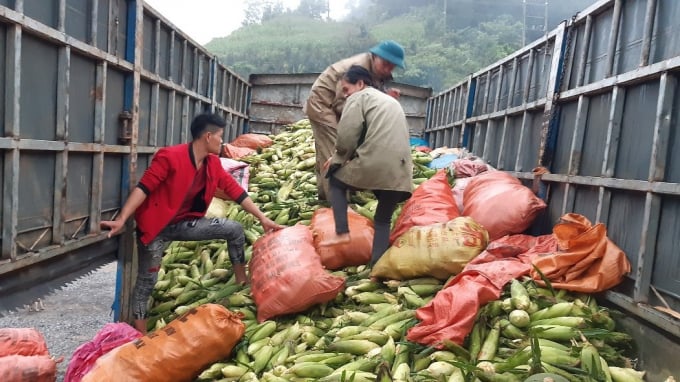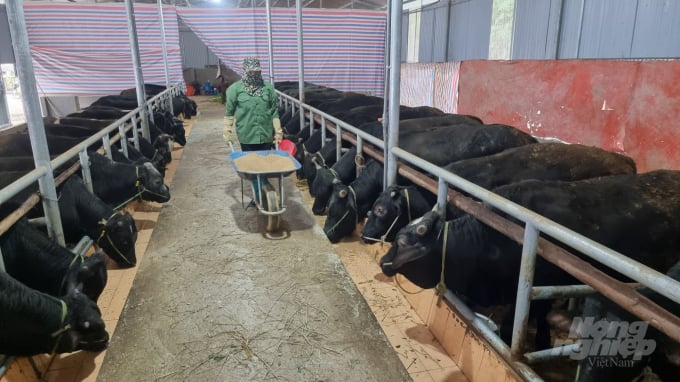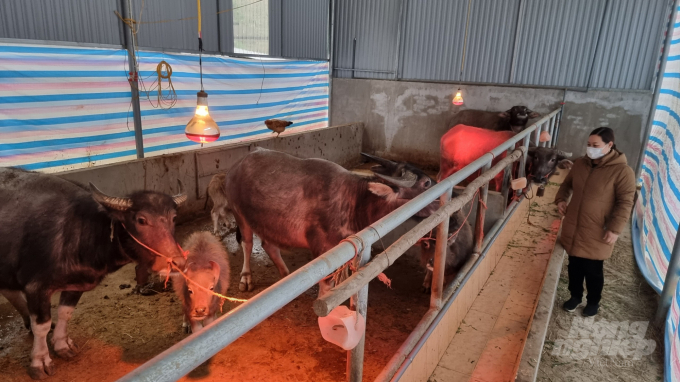May 21, 2025 | 05:35 GMT +7
May 21, 2025 | 05:35 GMT +7
Hotline: 0913.378.918
May 21, 2025 | 05:35 GMT +7
Hotline: 0913.378.918
As a mountainous province with a wide range of difficulties in organizing agricultural commodity production, since 2020 the Center for Agricultural Extension of Bac Kan has worked with the People's Committee of Thuan Mang community (Ngan Son district) to establish 2 cooperative groups with the participation of 24 households. They have grown the autumn-winter peanut in value chain.

Enterprises pledge to cover consumer products. Photo: Ngoc Phung.
The Legume Research and Development Center under the Field Crops Research Institute committed to provide seeds to the local farmers and buy their harvests. After three months of planting, from October to December 2020, the yield of peanut was around 20 quintals per hectare and the price was VND28,000 per kilo at time of purchase, VND2,000 higher than the contract price. On average, a hectare of peanut could generate VND56 million and net profit was around VND20 million per hectare.
In 2021, a value chain-based peanut farming model was experimented in Phuong Vien commune, Cho Don district. The average yield was 22 quintal per hectare. One kilo of dried peanut was sold for VND28,000 equivalent to VND61million of total revenue per hectare.
Peanut plants were helpful in the improvement of soil; bringing income 1.5-2 times higher from rice and corn. From that success, in 2022 many localities in Bac Kan have linked up with the province's agricultural extension agency to carry out the model.
Over the past two years, Bac Kan's Center for Agricultural Extension connected 16 farming groups in the districts of Ba Be and Na Ry to GVA company to cultivate Actrice potato variety. Average yield varied from 12 to15 tons per hectare. After deducting all expenses farmers made profit of VND25-35 million per hectare while the crop could be harvested every three months.

Sweet corn is widely grown in the districts of Ngan Son, Na Ry and Pac Nam. Photo: Ngoc Phung.
In addition to peanut, sweet corn was also a major crop grown in the districts of Ngan Son, Na Ry and Pac Nam.
In 2021, with the support from the central and provincial budget along with other sources, Bac Kan's agricultural extension agency implemented 16 technology transfer models including commercial rice production model and the projects on growing new rice varieties and medicinal plants in chain.
For medicinal plants, Bac Kan's agricultural extension center has successfully developed an Ardisia silvestris growing models as well as a project on building a model of growing medicinal plants associated with consumption in a number of northern provinces in the 2019-2021 period.
Regarding livestock production, Bac Kan’s agricultural extension agency has deployed the model of raising indigenous pig breeds at the household scale, guaranteeing environmental protection with the use of multi-function feed processing machines in the communes of Tran Phu, Luong Thuong (Na Ri district).

A BBB cattle-raising model carried out by Hung Manh Cooperative in Nguyen Phuc commune, Bach Thong district. Photo: Toan Nguyen.
The initial performance evaluation showed that multi-function feed processing machines could make the most of locally available raw materials including corn, paddy rice and forage, contributing to reducing production costs and increasing output as well as adding value to farm produce.
In addition, the models of biosecurity in intensive aquaculture, raft floating fish farming and duck breeding have been effective. Among the outstanding breeding models was Hung Manh Cooperative located in Bach Thong district. Currently, the cooperative has over 80 BBB beef cattle along with goats, chickens and ducks. To ensure feed the cooperative grew nearly 3 hectares of grass, 6,000 hectares of forage corn in addition to raising earthworms. The total investment amount was up to VND5billion, mostly borrowed from banks.

Agricultural extension models have contributed to changing the farmers’ farming practices. Photo: Toan Nguyen.
Lanh Thi Nhu, Director of Hung Manh Cooperative said in the past it failed to raise pigs because of the African Swine Fever outbreaks. After taking field trips organized by Bac Kan’s Agricultural Extension Center she decided on turning to raising cattle to make use of abundant land resources in the area
“Bac Kan’s Agricultural Extension Center has helped us make plans, instructing us how to borrow money, how to build breeding facilities. Basically, we have achieved success,” Lanh said.
According to Hoang Van Hung, Director of the Center for Agricultural Extension of Bac Kan province, in the previous years, enterprises rarely invested in Bac Kan because it was one of the poorest province in Vietnam and farmers here remained using old farming methods. Therefore, to develop value chain-based agricultural commodity production it’s important to attract enterprises to invest in farming and consuming products.

A buffalo breeding model in Bach Thong district. Photo: Toan Nguyen.
With the application of science and technology in crop production, Bac Kan farmers’ incomes have been improved, averaging VND50 million per hectare for a 75-90 day cropping season. Thanks to the linkages with enterprises they were no longer worried about “bumper harvests, lower prices”. Along with that, livestock production has been more effective. Billion-dong farms were more and more popular in the area.
Bac Kan’s Center for Agricultural Extension has proactively worked with large-size businesses across the country to introduce the province’s potential and strengths to them. The Center has become a bridge connecting enterprises with farmers to develop raw material areas.
Vice Chairwoman of the People’s Committee of Bac Kan province Do Thi Minh Hoa affirmed Bac Kan targeted sustainable development, placing agriculture and forestry at the center of the development. On that basis, the competent authorities have made policies and come up with concrete solutions to reorganize and promote agricultural commodity production. Combining the programs on agricultural and rural development with the implementation of the One Commune- One Product program (OCOP) was considered a key solution for agricultural development. In this orientation, Bac Kan’ s Center for Agricultural Extension has actually played an important role in transferring scientific and technological advances as well as connecting enterprises with farmers, farming groups and cooperatives.
Translated by Mai Tham

(VAN) Khanh Hoa is investing over 545 billion VND to develop 240 hectares of high-tech marine aquaculture in order to guarantee a consistent supply of seafood exports and achieve the USD 1 billion target.

(VAN) Minister of Agriculture and Environment Do Duc Duy held a meeting with Soopakij Chearavanont, Chairman of C.P. Group, on May 15.
/2025/05/16/3800-0-nongnghiep-143756.jpg)
(VAN) Suntory PepsiCo Vietnam coordinated with the Ministry of Education and Training to implement an education program on water conservation, reaching nearly 1 million primary school students nationwide.

(VAN) Vietnam’s TH Group officially put its high-tech fresh milk processing plant into operation in the Russian Federation, marking a historic moment as the first TH true MILK cartons were produced in Russia.

(VAN) Use of high-quality broodstock and biotechnology is regarded as the most effective approach to ensuring sustainable and economically viable shrimp aquaculture ahead of climate change and the emergence of increasingly intricate disease patterns.

(VAN) Carbon farming is a form of agricultural practices that helps absorb more greenhouse gases than it emits, through smart management of soil, crops, and livestock.

(VAN) This is a key content of the Memorandum of Understanding recently signed between the Vietnam Fisheries Society and Kunihiro Inc of Japan.